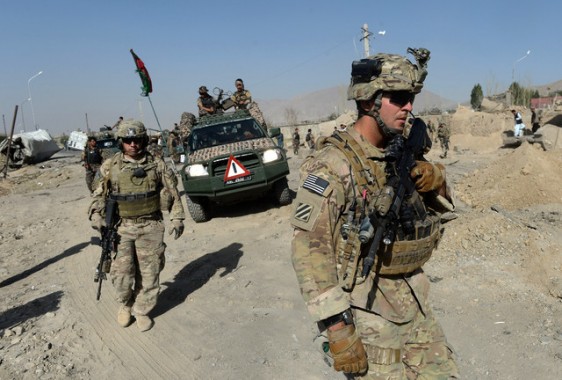
NATO pushed Afghanistan to agree to a scaled-back international troop presence after the withdrawal of all combat forces at the end of 2014, warning that the alternative would be a complete pullout that leaves the country at the mercy of a reinvigorated Taliban.
U.S. allies in Europe joined the Obama administration in pressuring Afghan President Hamid Karzai to sign the troop-stationing accord with the U.S., to allow time next year to shift international troops into a backup and training role.
While other U.S. officials have said the accord must be signed this month, Secretary of State John Kerry said today in Brussels that he hasn’t spoken of a “hard, fixed, specific” deadline. He said foreign ministers from all 28 NATO countries at a meeting “voiced a hope that this can be done sooner, not later.”
President Barack Obama’s administration and U.S. allies in the North Atlantic Treaty Organization plan to cut troop levels to about 8,000 to 12,000 by the start of 2015 from 84,000 now, ending a war that started with al-Qaeda using Afghanistan as a base for the Sept. 11, 2001 attacks.
While Afghan tribal elders have endorsed the security pact with the U.S. that would allow the follow-up mission aimed at training and counterterrorism, Karzai hasn’t signed it. He has raised a succession of objections about military operations that he says put Afghan civilians at risk and has suggested he may not be ready to sign the accord until after Afghanistan’s election to choose his successor as president in April.
‘Serious Business’
“This is not fooling around,” Kerry said of the agreement in remarks to reporters. “This is serious business.”
A U.S.-Afghanistan troop agreement would serve as the model for a NATO-Afghan accord and make international donors more comfortable in meeting pledges to provide $4 billion in military aid and $4 billion in economic aid annually, NATO Secretary General Anders Fogh Rasmussen said.
Rasmussen said a full pullout “is not our planning basis, but of course the so-called zero option can be the unfortunate outcome of decisions or non-decisions in Afghanistan.”
Source: Bloomberg.com








